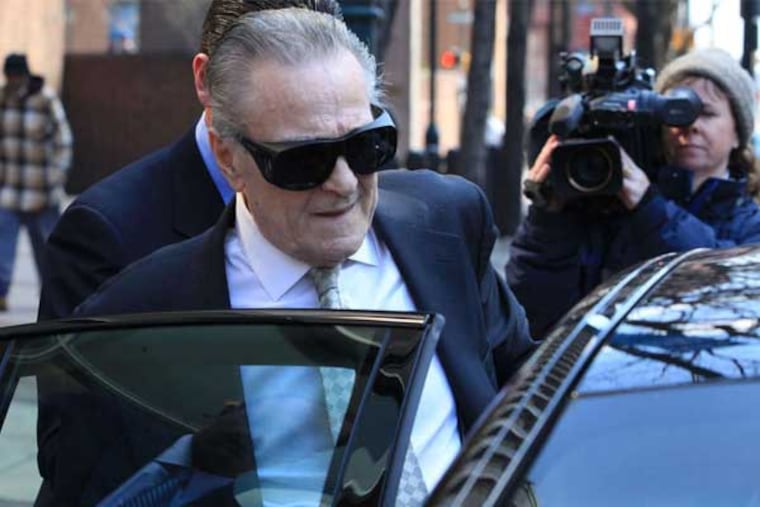Fortunato Perri Sr. gets probation in Traffic Court scandal
The former "hanging judge" of Philadelphia Traffic Court - a man so known for meting out tough justice to scofflaws that colleagues nicknamed him "the Terminator" - caught a break Friday when it came time for him to face up to his own crimes.

The former "hanging judge" of Philadelphia Traffic Court - a man so known for meting out tough justice to scofflaws that colleagues nicknamed him "the Terminator" - caught a break Friday when it came time for him to face up to his own crimes.
Fortunato N. Perri Sr., 78, was sentenced to two years of federal probation for using his influence to have dozens of traffic tickets tossed in exchange for bribes of shrimp, crab cakes, and pornographic videos.
The sentence was nothing less than an act of mercy for a man who once sentenced a driver to two years in jail for racking up $20,000 in traffic fines, but told him he would rather "give [him] the gas chamber."
Citing the ex-judge's advanced age, declining health, and lack of previous criminal history, U.S. District Judge Robert F. Kelly defended a punishment that kept Perri out of prison as appropriate.
"There are many justifications for sending a person to prison," Kelly said. "None of them applies to a situation such as this - a situation where we have such devastating physical health and mental health problems."
Under federal sentencing guidelines, Perri could have faced up to two years behind bars.
Moments before Kelly announced the punishment, Perri's attorney made an emotional appeal for leniency. "In my 30 years in this business, I have never begged for mercy," Brian J. McMonagle said. "I just never felt it was appropriate. But in this case I will beg.
"He's lost a great deal off of this - his good name, his pension. . . . I tell you, your honor, from the bottom of my heart and soul, he has been sentenced already."
McMonagle's pleading capped a hearing in which Perri's relatives tearfully described a man greatly diminished from the brash hard case who once presided from the Traffic Court bench.
Perri has suffered from two recent strokes, chronic Crohn's disease, near-blindness, and dementia - conditions that have only become more acute since he pleaded guilty to federal counts of conspiracy, and mail and wire fraud in 2013, the lawyer said.
As family members described Perri's recent bouts of confusion and inability to care for himself on his own, Perri's son - McMonagle's law partner and prominent Philadelphia defense lawyer Fortunato Perri Jr. - sat in the courtroom's front row, hands clenched in his lap, legs bouncing nervously until his father's fate was announced.
Even federal prosecutors - who have pushed for stiff prison terms for four of Perri's former Traffic Court colleagues - appeared hard-pressed to muster any real indignation. They asked Kelly for a sentence of house arrest.
"He was an integral part of the scheme of ticket-fixing at Philadelphia Traffic Court," Assistant U.S. Attorney Anthony Wzorek said. "I won't beg for mercy, but I will say house arrest is the right thing to do."
Perri said little on his own behalf, donning dark glasses to shield his eyes from the harsh courtroom lighting, occasionally removing them to dab his eyes with a handkerchief. "I'm sorry for the trouble I caused, and I apologize to the court," he said.
His terseness Friday marked a departure from the portrait of the foulmouthed political fixer that emerged on FBI wiretap recordings.
Perri rose through the city's Republican machine to be appointed to Traffic Court in 1997 and was later reelected to the post. In many ways, the man was ill-suited for the office.
A high school dropout with little legal training, Perri joined a court where ticket-fixing had long been an established feature of patronage.
Even after his retirement in 2011, Perri remained eager - between watching reruns of The Jerry Springer Show and preparing seafood feasts at Christmas - to show off the pull he had at Traffic Court.
"I still got a little connection," Perri was recorded telling one friend while discussing a ticket in 2011. "You want me to look into it?"
Many of the charges against Perri stemmed from his relationship with Henry "Eddie" Alfano, the owner of a towing and auto-repair company and landlord to two South Philadelphia strip clubs.
Alfano pleaded guilty last year to federal charges for plying Perri with gifts. In addition to intervening in dozens of traffic fines racked up by Alfano's employees, Perri awarded him a no-bid contract for Traffic Court towing work.
Perri touted his impartial judicial approach in a 2002 interview with The Inquirer: "It's my job to speak out, to let people know that when you commit motor-vehicle violations, you're breaking the law. You cannot get away with it, and if you think you can, sooner or later we'll get you. We'll either take your car or lock up your a-."
But behind chamber doors, he and his colleagues routinely passed requests for "consideration" among themselves that led to ticket dismissals for friends, family, and political allies.
Five Traffic Court judges have been sentenced to playing a role in the court's culture of corruption or lying about it to authorities. Two suburban magistrates, who often filled in at the court, have also been convicted.
State lawmakers abolished Traffic Court in 2013 amid the federal case. It has since been replaced with a traffic division within Municipal Court, staffed by city prosecutors and nonelected hearing officers.
215-925-2649 @jeremyrroebuck